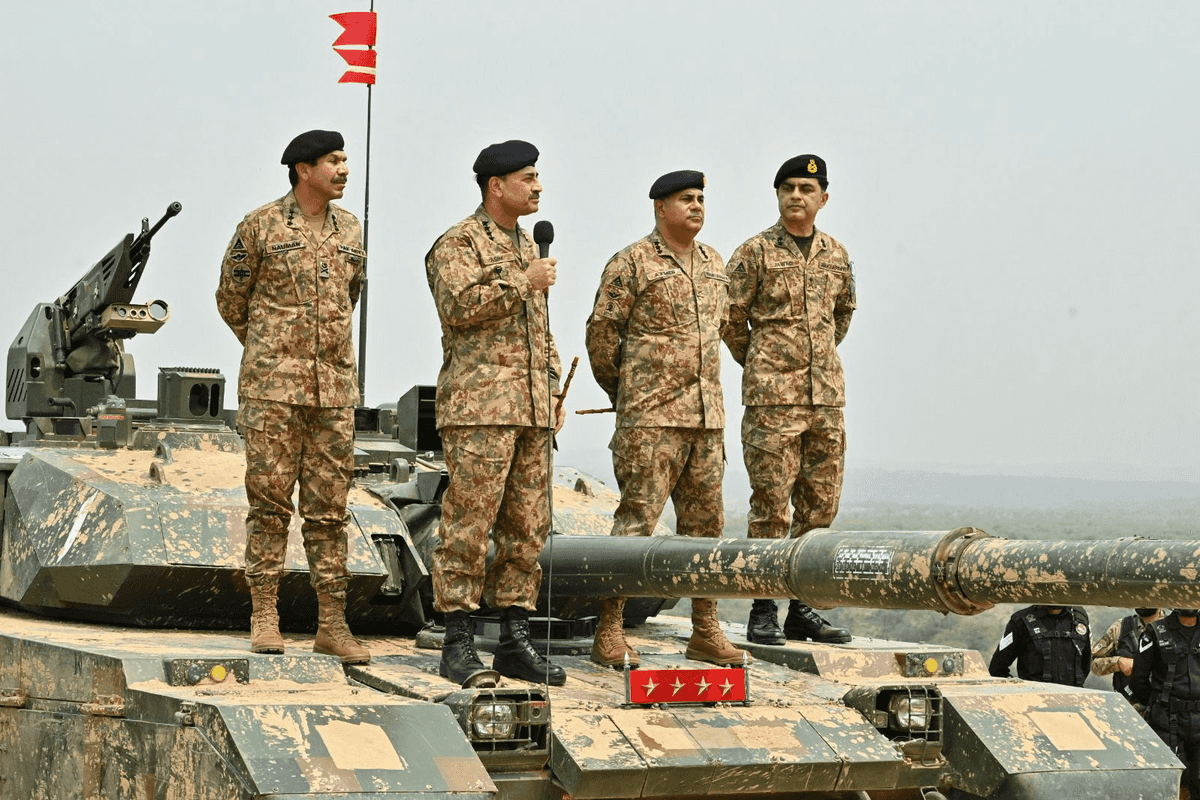Pakistan Army says any Indian military misadventure will be met with swift response
Army Chief Gen Asim Munir says Pakistan is committed to regional peace, but fully prepared to defend its national interests
News Desk
The News Desk provides timely and factual coverage of national and international events, with an emphasis on accuracy and clarity.

Pakistan Army Chief Gen. Syed Asim Munir (second from left) addresses "Exercise Hammer Strike", a field training exercise conducted by Pakistan Army’s Mangla Strike Corps.
ISPR
Pakistan’s Chief of Army Staff Gen Syed Asim Munir warned on Thursday that any military misadventure by India would be met with a “swift, resolute, and notch-up response,” as both sides navigate heightened hostilities.
His remarks came amid escalating tensions between the two nuclear-armed neighbors following a deadly attack in Pahalgam, Indian-administered Kashmir, in April that left 24 people -- mostly Indian tourists—dead.
While investigations into the incident remain inconclusive, India promptly blamed Pakistan, a charge Islamabad has strongly denied, calling instead for an impartial probe due to lack of evidence.
In retaliation, New Delhi suspended the decades-old Indus Waters Treaty and ordered Pakistani nationals to leave the country within 48 hours. Islamabad condemned the moves as unlawful and provocative, warning that any unilateral attempt to alter the water-sharing accord would be seen as “an act of war” and met with strong resistance.
In a show of military readiness, Gen Munir visited the Pakistan Army’s Mangla Strike Corps during “Exercise Hammer Strike” -- a high-intensity field training exercise.
According to the military’s media wing, Inter-Services Public Relations (ISPR), the drill was designed to demonstrate operational preparedness.
Addressing troops during the visit, Gen Munir reiterated, “Pakistan remains committed to regional peace, our preparedness and resolve to safeguard national interests is absolute.”
The army chief also praised the “high morale, combat proficiency, and warfighting spirit” of the officers and troops, calling them the embodiment of the Pakistan Army’s operational excellence.
The military statement said Exercise Hammer Strike reflects the Army’s commitment to ongoing transformation through rigorous training, doctrinal evolution, and technological advancement. It said the exercise was carefully designed to assess combat readiness, battlefield coordination, and the integration of advanced weapon systems in near-real battlefield conditions.
“A diverse array of advanced capabilities, including multirole fighter aircraft, combat aviation assets, long-range precision artillery, and next-generation field engineering techniques, were employed to simulate conventional battlefield scenarios,” ISPR said.
The statement added that troops from all arms and services demonstrated exceptional tactical cohesion, agility, and lethality during synchronized offensive maneuvers.
“Notably, the exercise showcased Pakistan Army’s increasing absorption of niche and emerging technologies to augment its kinetic and non-kinetic operational capabilities.”
Gen Munir’s remarks echo the position of Pakistan’s National Security Committee (NSC), which, in its April 24 huddle, called on India to abandon its “reflexive blame game and cynical, stage-managed exploitation” of attacks like the one in Pahalgam to serve narrow political ends.
The NSC had warned that any threat to Pakistan’s sovereignty or the safety of its people would be met with firm and reciprocal measures “across all domains.”
Mounting tensions
Tensions have been rapidly mounting in the week since the Pahalgam attack, with tit-for-tat diplomatic barbs, expulsion of citizens and land border crossings shut.
Indian police have issued wanted posters for three men accused of carrying out the Kashmir attack -- two Pakistanis and an Indian -- who they say are members of a UN-designated terrorist organization.
They have announced a INR 2 million ($23,500) bounty for information leading to each man's arrest and carried out sweeping detentions seeking anyone suspected of links to the alleged killers.
Disputed region
Kashmir, a Muslim-majority Himalayan region, is held by India and Pakistan in parts and claimed by both in full. A small sliver of Kashmir is also held by China.
Since they were partitioned in 1947, the two countries have fought three wars – in 1948, 1965, and 1971 – two of them over Kashmir.
Also, in the Siachen glacier in northern Kashmir, Indian and Pakistani troops have fought intermittently since 1984. A cease-fire came into effect in 2003.







Comments
See what people are discussing